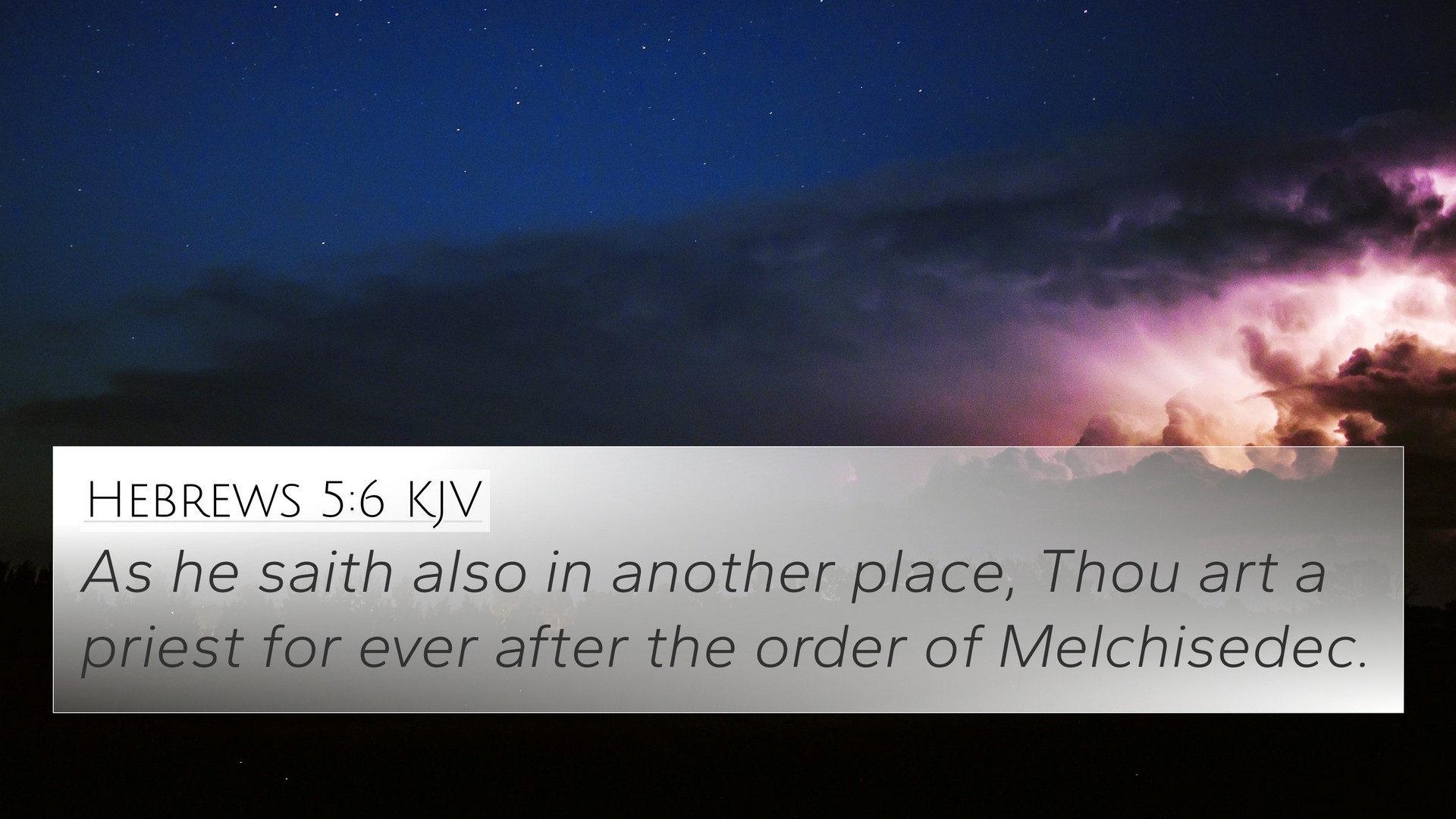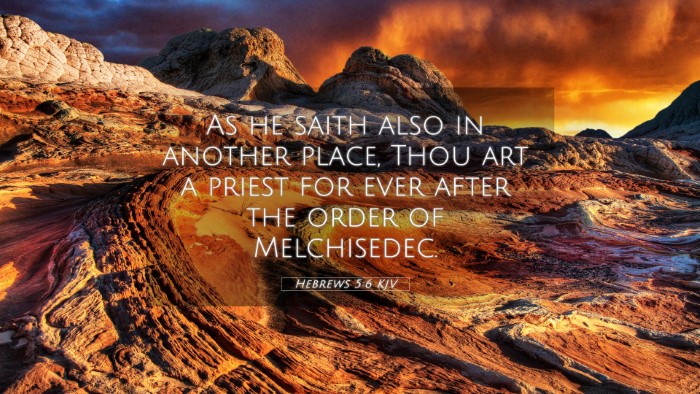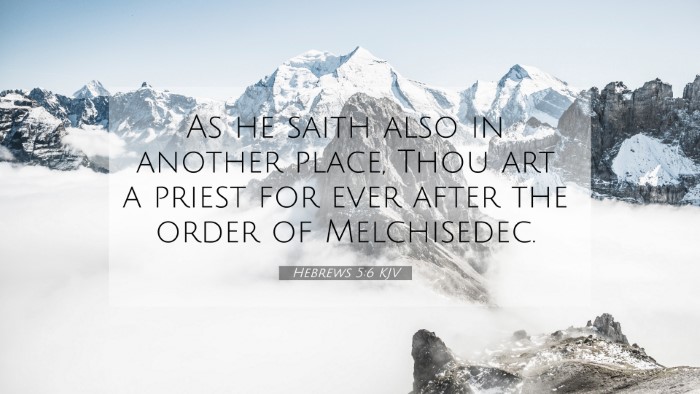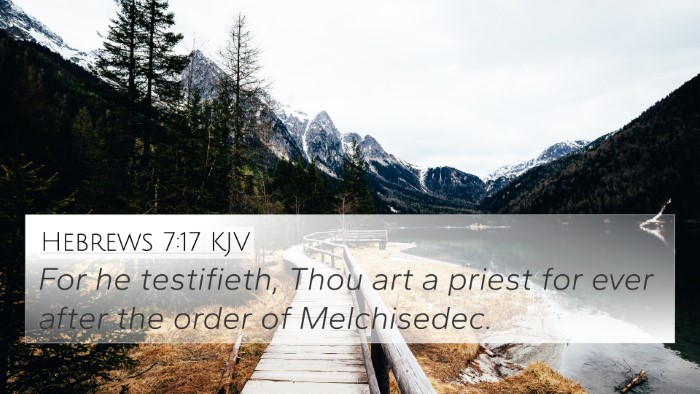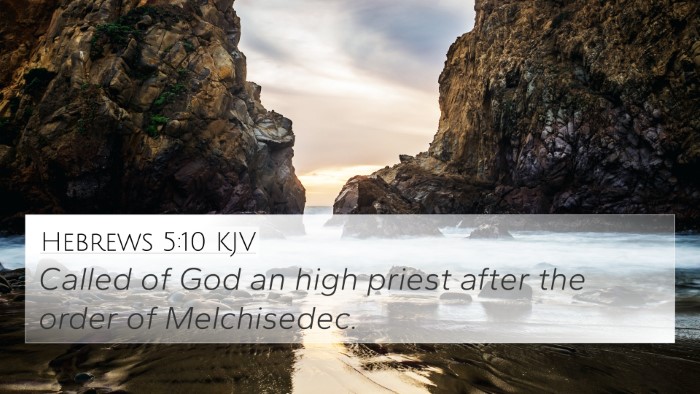Old Testament
Genesis Exodus Leviticus Numbers Deuteronomy Joshua Judges Ruth 1 Samuel 2 Samuel 1 Kings 2 Kings 1 Chronicles 2 Chronicles Ezra Nehemiah Esther Job Psalms Proverbs Ecclesiastes Song of Solomon Isaiah Jeremiah Lamentations Ezekiel Daniel Hosea Joel Amos Obadiah Jonah Micah Nahum Habakkuk Zephaniah Haggai Zechariah MalachiHebrews 5:6 Similar Verses
Hebrews 5:6 Cross References
As he saith also in another place, Thou art a priest for ever after the order of Melchisedec.
Uncover the Rich Themes and Topics of This Bible Verse
Listed below are the Bible themes associated with Hebrews 5:6. We invite you to explore each theme to gain deeper insights into the Scriptures.
Hebrews 5:6 Cross Reference Verses
This section features a detailed cross-reference designed to enrich your understanding of the Scriptures. Below, you will find carefully selected verses that echo the themes and teachings related to Hebrews 5:6 KJV. Click on any image to explore detailed analyses of related Bible verses and uncover deeper theological insights.
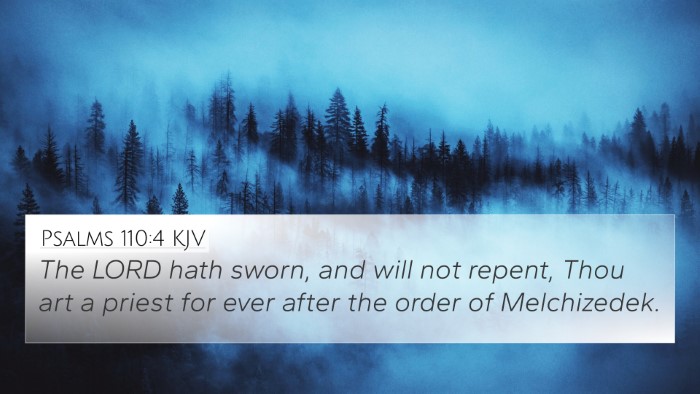
Psalms 110:4 (KJV) »
The LORD hath sworn, and will not repent, Thou art a priest for ever after the order of Melchizedek.
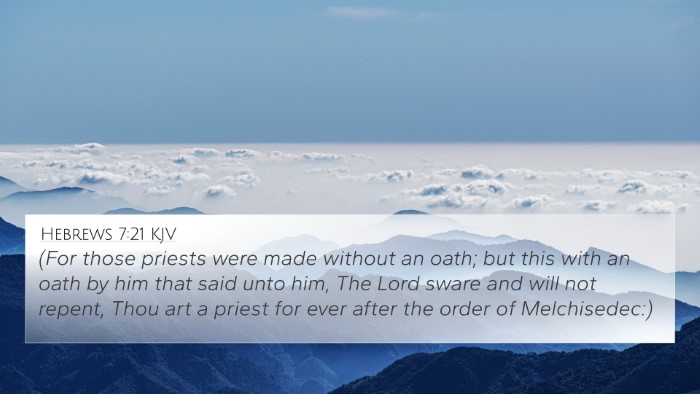
Hebrews 7:21 (KJV) »
(For those priests were made without an oath; but this with an oath by him that said unto him, The Lord sware and will not repent, Thou art a priest for ever after the order of Melchisedec:)
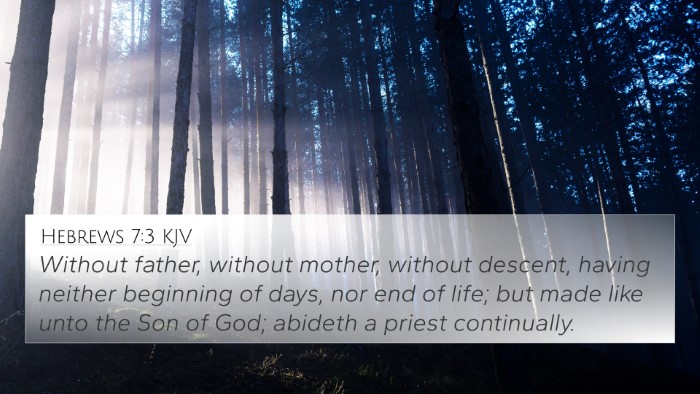
Hebrews 7:3 (KJV) »
Without father, without mother, without descent, having neither beginning of days, nor end of life; but made like unto the Son of God; abideth a priest continually.
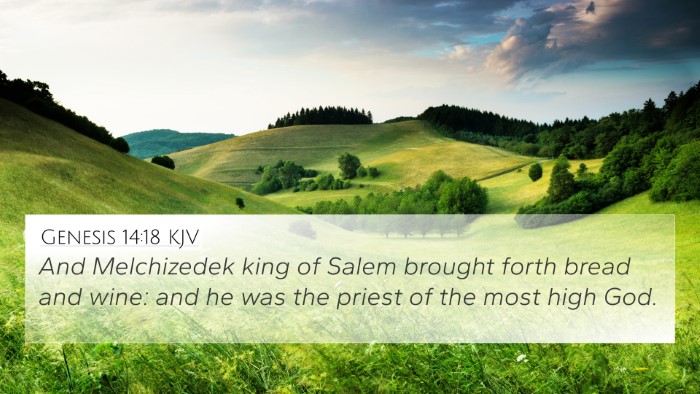
Genesis 14:18 (KJV) »
And Melchizedek king of Salem brought forth bread and wine: and he was the priest of the most high God.
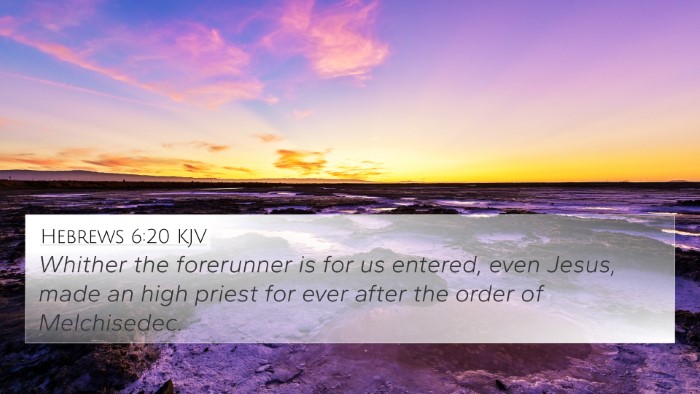
Hebrews 6:20 (KJV) »
Whither the forerunner is for us entered, even Jesus, made an high priest for ever after the order of Melchisedec.
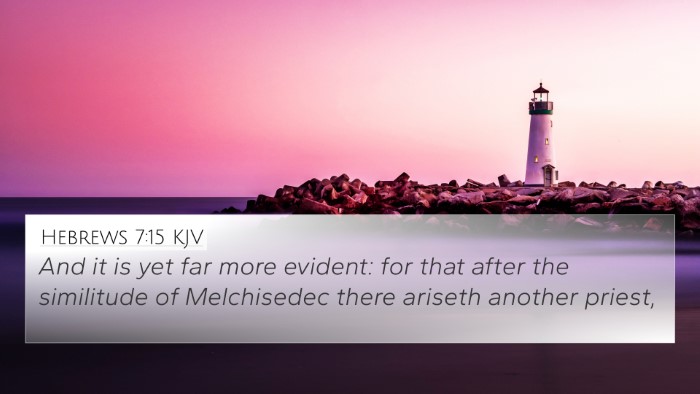
Hebrews 7:15 (KJV) »
And it is yet far more evident: for that after the similitude of Melchisedec there ariseth another priest,
Hebrews 5:6 Verse Analysis and Similar Verses
Understanding Hebrews 5:6
Hebrews 5:6 states: "As he saith also in another place, Thou art a priest for ever after the order of Melchisedec."
This verse serves as a significant point in the outline of the Book of Hebrews, emphasizing the superior priesthood of Christ as compared to the Levitical priesthood.
Summary of Biblical Interpretation
Here, we present insights from several public domain commentaries to better understand the theological depth of Hebrews 5:6.
Matthew Henry Commentary
Matthew Henry underlines that the author of Hebrews establishes Jesus as a priest with an unending ministry, akin to Melchizedek, who serves as a prototype of an eternal priesthood. This highlights the belief that Jesus’s priestly role is not temporary or confined to the traditional temple system, but rather everlasting and effective for the redemption of humanity. This unique role suggests a new covenant, which is central to the writer’s argument.
Albert Barnes Commentary
Albert Barnes notes that the mention of Melchizedek serves as a reminder of the unique character of Christ’s priesthood. Unlike the Aaronic priests, who were subject to death and succession, Melchizedek’s priesthood is portrayed as eternal. Barnes elaborates on the implications of this for Christian identity by stressing that believers now have direct access to God through Christ’s unchanging priesthood.
Adam Clarke Commentary
Adam Clarke emphasizes the importance of understanding Melchizedek’s role in presenting a priesthood that stands in contrast to the Levitical system. He elaborates that the eternal nature of Christ’s priesthood signifies that He is the ultimate mediator between God and man. This assertion is crucial for establishing the Christian faith, drawing connections with the Old Testament to highlight how God prepared a way for the fulfillment of His promises through Christ.
Thematic Connections and Cross-References
This verse is not isolated but is rather interconnected with various other biblical texts. Below are some relevant cross-references that reveal the thematic continuity across the Scriptures:
- Psalm 110:4 - "The LORD hath sworn, and will not repent, Thou art a priest for ever after the order of Melchizedek." This Old Testament prophecy establishes the foundation for Jesus’s eternal priesthood.
- Genesis 14:18-20 - The historical account of Melchizedek blessing Abraham and receiving tithes illustrates his significance as a priest and king, foreshadowing Christ’s dual role.
- Hebrews 7:17 - "For he testifieth, Thou art a priest for ever after the order of Melchisedec." This reaffirms the argument made in Hebrews 5:6 about Christ’s eternal priesthood.
- Hebrews 7:23-24 - These verses further emphasize the permanence and superiority of Christ's priesthood, contrasting it with the temporary nature of the Levitical priests.
- Romans 5:9-10 - These verses highlight the redemptive work of Christ, linked to His role as a priest who reconciles believers to God.
- 1 Timothy 2:5 - "For there is one God, and one mediator between God and men, the man Christ Jesus." This verse solidifies the unique mediatorial role of Christ.
- 1 Peter 2:9 - This passage speaks to the believer’s priestly identity in Christ, linking the idea of a new covenant established through His eternal priesthood.
Exploring Cross-Referencing Connections
Understanding the connections in Scripture enhances our appreciation for the themes of fellowship, redemption, and the eternal nature of God’s promise.
Cross-references act as a guiding tool, providing context, clarifying meanings, and deepening theological insights. For those eager to study Scripture in context, identifying these scriptural cross-references can aid in comprehending the overall narrative of the Bible.
Utilizing Bible Cross-Reference Tools
Tools such as a Bible concordance or a Bible cross-reference guide can assist in tracing these connections. These resources help believers not only in sermon preparation but also in personal study, allowing for deeper theological reflections on how different scriptures relate to each other.
By utilizing these references, readers can unlock the interconnectedness of the Old and New Testament, enriching their understanding of biblical themes and the character of God through Christ, our eternal Priest.
Conclusion
Hebrews 5:6 serves as a powerful reminder of Jesus's priestly role, marking a pivotal transition from the old covenant of the Levitical priesthood to the new covenant established in Christ. Understanding and engaging with these themes allows for a more profound grasp of Scripture and fosters spiritual growth.
